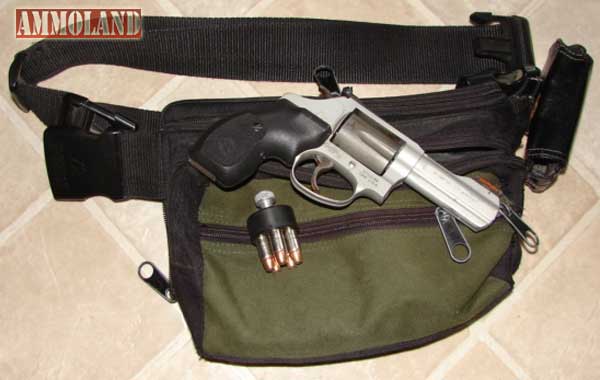By Dean Weingarten


Arizona – -(Ammoland.com)- I attended the Gun Rights Policy Conference in Illinois last weekend. After the event, I met another attendee in Wisconsin.
Don Hosmer recalled disarming before entering Illinois, and seeing several others do so as well. As a result, I decided to explore the problems and possibilities of carry in Illinois for a non-resident.
You could apply for, and obtain an Illinois concealed carry permit. They are backed up at present, but it looks like it would be possible, if somewhat difficult. From the Illinois State Police site:
Sec. 40. Non-resident license applications.
(a) For the purposes of this Section, “non-resident” means a person who has not resided within this State for more than 30 days and resides in another state or territory.
(b) The Department shall by rule allow for non-resident license applications from any state or territory of the United States with laws related to firearm ownership, possession, and carrying, that are substantially similar to the requirements to obtain a license under this Act.
It is unclear exactly how “substantially similar” will be interpreted.
If you have not obtained a non-resident Illinois CCW license, you may still carry concealed in your vehicle. Here is the relevant portion of the law:
(e) Nothing in this Act shall prohibit a non-resident from transporting a concealed firearm within his or her vehicle in Illinois, if the concealed firearm remains within his or her vehicle and the non-resident:
(1) is not prohibited from owning or possessing a firearm under federal law;(2) is eligible to carry a firearm in public under the laws of his or her state or territory of residence, as evidenced by the possession of a concealed carry license or permit issued by his or her state of residence, if applicable; and
(3) is not in possession of a license under this Act.
If the non-resident leaves his or her vehicle unattended, he or she shall store the firearm within a locked vehicle or locked container within the vehicle in accordance with subsection (b) of Section 65 of this Act.
(Source: P.A. 98-63, eff. 7-9-13; 98-600, eff. 12-6-13.)
Don talked with Massad Ayoob and others at the conference and found the act on the Illinois State Police web site. It is worth noting that under the frequently asked questions (faq), the site is a bit misleading:
How will Illinois State Police (ISP) officers and local law enforcement respond to citizens who are carrying weapons?The ISP will continue to enforce the law in effect. Persons who carry firearms without a Concealed Carry License issued by the ISP are subject to arrest.
That is not strictly true. If you can carry in your home state, and are in your vehicle, you can carry concealed, as stated above under section (e). if an officer asks you if you are armed, you have to tell them:
(h) If an officer of a law enforcement agency initiates an investigative stop, including but not limited to a traffic stop, of a licensee or a non-resident carrying a concealed firearm under subsection (e) of Section 40 of this Act, upon the request of the officer the licensee or non-resident shall disclose to the officer that he or she is in possession of a concealed firearm under this Act, present the license upon the request of the officer if he or she is a licensee or present upon the request of the officer evidence under paragraph (2) of subsection (e) of Section 40 of this Act that he or she is a non-resident qualified to carry under that subsection, and identify the location of the concealed firearm. During a traffic stop, any passenger within the vehicle who is a licensee or a non-resident carrying under subsection (e) of Section 40 of this Act must comply with the requirements of this subsection (h)
This might cause a problem if an officer stops you, asks if you are armed, you inform them that you are armed, and they then order you from the vehicle. There is also the example of the famous case in Canton, Ohio, where the officer never allowed the holder of the concealed weapon permit to inform him that he was armed.
Note that the concealed carry law in Illinois is a concealed *firearm* law. It does not appear to cover knives. Knife law in Illinois is somewhat open to interpretation. From knifeup.com:
This law bans brass knuckles, throwing stars, switchblades (and other automatic knives), and ballistic knives in the state of Illinois. The case of People v. Gazelle found that the knife ban in section (a)(1) only applies to switchblade knives or ballistic knives. Other knives that are not switchblades and ballistic knives are not banned. This means that balisong knives, also called butterfly knives, are legal.
The law also makes it illegal to open or concealed carry daggers, dirks, razors, stilettos, “dangerous knife,” and other similar dangerous weapons when you are attempting to harm someone else. You can also carry dirks, razors, daggers, stilettos, and “dangerous knives” all you want as long as you do not have the intent of harming another person.
Preemption law does not appear to cover knives yet, so there exists the possibility of local ordinances that could trip you up.
Knife-expert.com offers this Illinois case law information:
Illinois Case Law: – “Possession of hunting knife is not a crime; however, knowingly carrying or possessing dangerous weapon with intent to use same unlawfully against another constitutes offense…”
(1982) – “Weapon not listed in statute can become “dangerous weapon” when it is used in a manner dangerous to well being of individual threatened, and knife with blade less than 3 inches in length can be dangerous weapon if used in such manner.”
(1991) – “A straight-blade razor did not constitute a per se dangerous weapon, for purposes of armed violence charge…”
(1987) – “Walking cane, even if not per se dangerous, was… transformed by defendant’s usage into a dangerous weapon.” (1977)
The Chicago ordinance 8-24-020 says that:
No person shall carry concealed on or about his person a pistol, revolver, derringer or other firearm or dagger, dirk, stiletto, bowie knife, commando knife, any blade of which is released by a spring mechanism, including known knives as “switch-blades” or any other type or kind of knife, any blade of which is more than two and one-half inches in length, ordinary razor or other dangerous weapon except that no person 18 years of age or under shall carry concealed on or about his person, any knife, the blade of which is two inches in length or longer.
I was not going into Chicago proper. I would be careful about carrying a blade there. It seems clear to me that arms under the second amendment include knives, but I do not wish to be the test case.
Another interesting part of Illinois law, is that you can carry an unloaded firearm in a case. This has become known as “unloaded fannypack carry“.
What is left for Illinois residents, today, right now, is commonly referred to as “Container Transport” or “Fanny Pack Carry”. It means having a FOID card (Illinois residents only) and transporting your firearm “Unloaded and enclosed in a case”. Ammo is not regulated and you can have loaded magazines or speed loaders in the same case or in your pocket, or in an ammo pouch on your belt. Everywhere in Illinois! Also, there are different prohibited places for “Transport” than for concealed carry ; license holders. Places prohibited like public transportation or neighborhood festvals for concealed carry are perfectly fine to “Container Transport”. Research these yourself.
The Illinois Supreme court has ruled that a person with a concealed carry permit from another state does not need an FOID card, so fannypack carry should apply to those non-residents with concealed carry permits.

It appears that a non-resident may carry a loaded, concealed firearm in a fannypack in their vehicle, then, when leaving the vehicle, unload it and carry the unloaded firearm and a charged speedloader or magazine in the fannypack with the firearm.
It might not be the quickest weapon to employ, but you would have it with you.
To sum up:
A non-resident can apply for an Illinois concealed carry permit, but I have not yet seen data as to what states are eligible. A correspondent informs me that only Hawaii, New Mexico, South Carolina, and Virginia have been classified by Illinois as “substantially similar”.
Non-residents can carry concealed in their vehicle if they can legally do so in their state of residence.
Non-residents can carry “unloaded fannypack” style if they have a concealed carry permit from their state.
Knives are generally permitted to be carried, but there may be local ordinances that could trip you up.
There is a long list of places where concealed carry of firearms by licensees are prohibited. It does not seem to apply to fannypack carry.
I am not a lawyer, not do I play one on the Internets. The links above take you to the law, so you can decide for yourself what it says. It is likely that case law and the courts will provide further clarification.
c2014 by Dean Weingarten: Permission to share is granted when this notice is included. Link to Gun Watch
About Dean Weingarten;
Dean Weingarten has been a peace officer, a military officer, was on the University of Wisconsin Pistol Team for four years, and was first certified to teach firearms safety in 1973. He taught the Arizona concealed carry course for fifteen years until the goal of constitutional carry was attained. He has degrees in meteorology and mining engineering, and recently retired from the Department of Defense after a 30 year career in Army Research, Development, Testing, and Evaluation.
